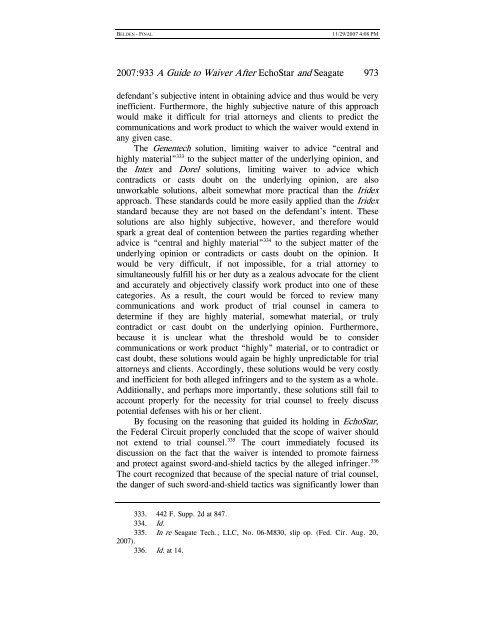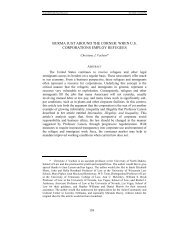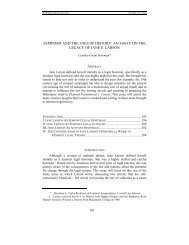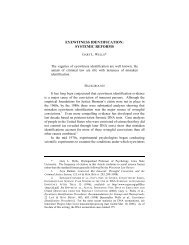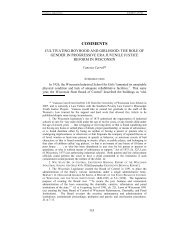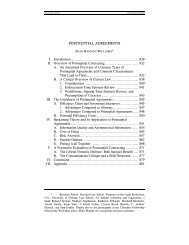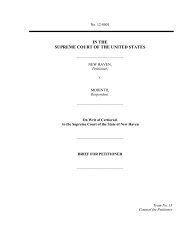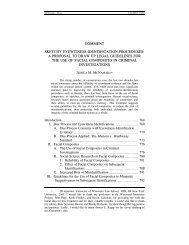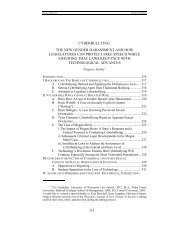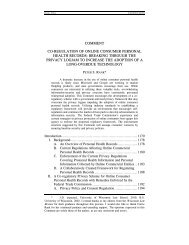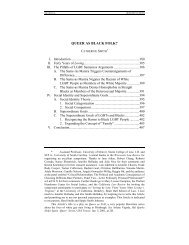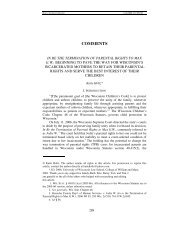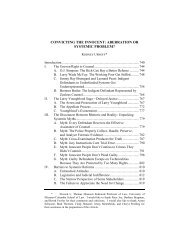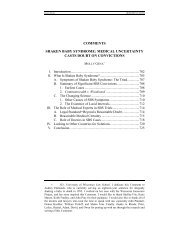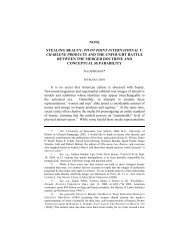note a guide to waiver after echostar and seagate - UW Law School
note a guide to waiver after echostar and seagate - UW Law School
note a guide to waiver after echostar and seagate - UW Law School
You also want an ePaper? Increase the reach of your titles
YUMPU automatically turns print PDFs into web optimized ePapers that Google loves.
BELDEN - FINAL 11/29/2007 4:08 PM<br />
2007:933 A Guide <strong>to</strong> Waiver After EchoStar <strong>and</strong> Seagate 973<br />
defendant’s subjective intent in obtaining advice <strong>and</strong> thus would be very<br />
inefficient. Furthermore, the highly subjective nature of this approach<br />
would make it difficult for trial at<strong>to</strong>rneys <strong>and</strong> clients <strong>to</strong> predict the<br />
communications <strong>and</strong> work product <strong>to</strong> which the <strong>waiver</strong> would extend in<br />
any given case.<br />
The Genentech solution, limiting <strong>waiver</strong> <strong>to</strong> advice “central <strong>and</strong><br />
highly material” 333 <strong>to</strong> the subject matter of the underlying opinion, <strong>and</strong><br />
the Intex <strong>and</strong> Dorel solutions, limiting <strong>waiver</strong> <strong>to</strong> advice which<br />
contradicts or casts doubt on the underlying opinion, are also<br />
unworkable solutions, albeit somewhat more practical than the Iridex<br />
approach. These st<strong>and</strong>ards could be more easily applied than the Iridex<br />
st<strong>and</strong>ard because they are not based on the defendant’s intent. These<br />
solutions are also highly subjective, however, <strong>and</strong> therefore would<br />
spark a great deal of contention between the parties regarding whether<br />
advice is “central <strong>and</strong> highly material” 334 <strong>to</strong> the subject matter of the<br />
underlying opinion or contradicts or casts doubt on the opinion. It<br />
would be very difficult, if not impossible, for a trial at<strong>to</strong>rney <strong>to</strong><br />
simultaneously fulfill his or her duty as a zealous advocate for the client<br />
<strong>and</strong> accurately <strong>and</strong> objectively classify work product in<strong>to</strong> one of these<br />
categories. As a result, the court would be forced <strong>to</strong> review many<br />
communications <strong>and</strong> work product of trial counsel in camera <strong>to</strong><br />
determine if they are highly material, somewhat material, or truly<br />
contradict or cast doubt on the underlying opinion. Furthermore,<br />
because it is unclear what the threshold would be <strong>to</strong> consider<br />
communications or work product “highly” material, or <strong>to</strong> contradict or<br />
cast doubt, these solutions would again be highly unpredictable for trial<br />
at<strong>to</strong>rneys <strong>and</strong> clients. Accordingly, these solutions would be very costly<br />
<strong>and</strong> inefficient for both alleged infringers <strong>and</strong> <strong>to</strong> the system as a whole.<br />
Additionally, <strong>and</strong> perhaps more importantly, these solutions still fail <strong>to</strong><br />
account properly for the necessity for trial counsel <strong>to</strong> freely discuss<br />
potential defenses with his or her client.<br />
By focusing on the reasoning that <strong>guide</strong>d its holding in EchoStar,<br />
the Federal Circuit properly concluded that the scope of <strong>waiver</strong> should<br />
not extend <strong>to</strong> trial counsel. 335 The court immediately focused its<br />
discussion on the fact that the <strong>waiver</strong> is intended <strong>to</strong> promote fairness<br />
<strong>and</strong> protect against sword-<strong>and</strong>-shield tactics by the alleged infringer. 336<br />
The court recognized that because of the special nature of trial counsel,<br />
the danger of such sword-<strong>and</strong>-shield tactics was significantly lower than<br />
333. 442 F. Supp. 2d at 847.<br />
334. Id.<br />
335. In re Seagate Tech., LLC, No. 06-M830, slip op. (Fed. Cir. Aug. 20,<br />
2007).<br />
336. Id. at 14.


